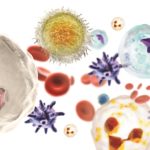CFTR Modulation Therapy Improves Markers of Inflammation and Lung Function in Cystic Fibrosis
CFTR Modulation Therapy Improves Markers of Inflammation and Lung Function in Cystic Fibrosis https://pediatricsnationwide.org/wp-content/uploads/2021/02/AdobeStock_126797930_lung-header-1024x575.gif 1024 575 Jessica Nye, PhD Jessica Nye, PhD https://secure.gravatar.com/avatar/?s=96&d=mm&r=g- December 27, 2022
- Jessica Nye, PhD

Six months of elexacaftor-tezacaftor-ivacaftor (ETI) therapy significantly reduced proinflammatory cytokines, increased immune cell composition, and improved clinical outcomes in cystic fibrosis (CF).
“Cystic fibrosis is a progressive lung disease that carries significant morbidity,” says Shahid Sheikh, MD, of the Pulmonary Medicine and Allergy/Immunology section at Nationwide Children’s Hospital and a professor at The Ohio State University College of Medicine. “Recently, there are new medications called CFTR [CF transmembrane conductance regulator] modifiers which try to correct the protein that causes CF at the cellular level. There’s a lot of hope that with these new medications we will be able to decrease morbidity and help control this disease in a much better way.”

Shahid Sheikh, MD
To test the effect of ETI therapy, a CFTR modulator, 48 patients with CF were enrolled in this study at the time of ETI initiation. Clinical characteristics and lung functions were noted at baseline and blood was drawn to evaluate immune cell populations and cytokine analysis. Clinical characteristics and lung function were assessed every three months up to one year and blood samples were collected after six months on ETI therapy. Clinical characteristics were compared with that of 20 healthy controls.
The patient group was aged mean 28.8 years and the control cohort 33.9 years.
At baseline, the patients had elevated interleukin (IL)-6, IL-8, and IL-17A and depressed IL-13 (all P £.001) levels compared with controls. After six months of ETI therapy, IL-6, IL-8, and IL-17A levels decreased significantly (all P £.004).
For immune cell populations, compared with controls (n=5) at baseline, the patients (n=15) had significantly elevated neutrophils and depressed CD3+ T cells, CD3+CD4+CD8- T helper cells, CD3+CD4-CD8+ cytotoxic T cells, CD19+ B cells, and CD56+CD16- natural killer cells (all P £.025). After three months of therapy, neutrophil levels decreased (P =.003) and eosinophil (P =.0001) and CD3+CD4+CD8+ T cell (P =.033) levels increased.
“At baseline the people with CF had increased macrophage- and T cell-mediated inflammation compared to the healthy individuals. After six months of therapy, we noticed that there was a significant improvement in most of these markers. Though they were still not at the levels of healthy controls, many were significantly improved,” says Dr. Sheikh.
Lung function also improved from a percent forced expiratory volume in one second (%FEV1) of 63% at baseline to 71% at three months (P <.001) and to 68% at one year (P <.001).
Dr. Sheikh concludes, “It is very pleasant to see that in last 15-20 years, CF care has been revolutionized, and it’s still getting better every day. I’m honored to have been a part of this transformation in care over the last almost 25 years. It’s amazing to see how this disease, which used to change the lives of the families, has evolved in such a way that now we can give them hope and we can tell them that their children can live long and happy lives. We do believe that outcomes will continue to improve with time. That’s something for which I don’t have any words to explain.”
Sheikh S, Dritt RD Jr, Ryan-Wenger NA, Khan AQ, Lewis BW, Gushue C, Ozuna H, Jaganathan D, McCoy K, Kopp BT. Impact of elexacaftor-tezacaftor-ivacaftor on bacterial colonization and inflammatory responses in cystic fibrosis. Pediatr Pulmonol. Published online November 29, 2022. PMID: 36444736. DOI: 10.1002/ppul.26261
About the author
Jessica Nye, PhD, is a freelance science and medical writer based in Barcelona, Spain. She completed her BS in biology and chemistry and MS in evolutionary biology at Florida State University. Dr. Nye studied population genetics for her doctorate in biomedicine at University of Pompeu Fabra. She conducted her postdoctoral research on the inheritance of complex traits at the Autonomous University of Barcelona.
-
Jessica Nye, PhDhttps://pediatricsnationwide.org/author/jessica-nye-phd/
-
Jessica Nye, PhDhttps://pediatricsnationwide.org/author/jessica-nye-phd/
-
Jessica Nye, PhDhttps://pediatricsnationwide.org/author/jessica-nye-phd/January 3, 2022
-
Jessica Nye, PhDhttps://pediatricsnationwide.org/author/jessica-nye-phd/










